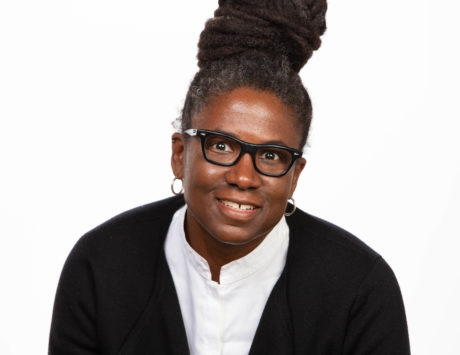
Association of Collegiate Schools of Planning
Portal Project organizer Stacey Sutton is award Edward Blakely Award for 2021 by the Association of Collegiate Schools of Planning and Planning of Colors Interest Group.
“A Closer Look at Stacey Sutton
POCIG Edward Blakely Award
ACSP along with the Planners of Color Interest Group (POCIG) is pleased to announce that Stacey Sutton is the winner of the 2021 Edward Blakely Award.
Sutton is an Associate Professor in the Department of Urban Planning and Policy and the Director of Applied Research and Strategic Partnerships at the University of Illinois Chicago’s Social Justice Initiative. She was recently honored virtually at the ACSP Annual Conference.
POCIG, a group affiliated with ACSP, established the Edward Blakely Award in 2011, with the first recipient being honored in 2012. This achievement award is given to an honoree who has supported the cause of social justice, particularly in urban planning or development, for communities of color.
The award selection committee had this to say, “Dr. Sutton’s interests, endeavors and accomplishments speak to multiple dimensions of the Blakely Award’s spirit and POCIG’s mandate and aspirations. She is making a difference for POC locally and nationally with research and advocacy that aim to eradicate the widespread criminalization of poverty and structural economic violence in Black and Brown communities, while providing meaningful and creative alternatives of economic democracy. Dr. Sutton is a brilliant urban planning researcher specializing in the development and analysis of cooperatives and solidarity economies as a strategy for realizing greater economic democracy and racial justice. Her service is exemplary. She is well connected and very much ‘plugged into’ community organizations and activists, both in Chicago and beyond.”
Sutton’s scholarship and teaching are in community economic development, with a central focus on racial and economic justice; economic democracy and worker-owned cooperatives; movement building and the solidarity economy; gentrification and dispossession; neighborhood small business dynamics and disparate effects of punitive policy.
Her frameworks for research and community engagement entail advancing “cooperative cities” and the solidarity economy and critiquing “punitive cities.”
In a recent study of cooperative cities, Sutton examines how local governments in 12 cities are creating enabling environments for worker cooperatives and community wealth building, by supporting the development and sustainability of worker-owned enterprises and deepening the cooperative ecosystem. Local governments can play an important supportive role, the cooperative movement is principally grassroots led. Through Sutton’s new body of cooperative city research, Real Black Utopias, she examines the infrastructure and ideology of Black-led cooperatives and solidarity economy ecosystem in multiple cities.
“Punitive cities” encapsulates Sutton’s diverse research on racially disparate effects of universal city policies and place-based initiatives. This includes studies such as the distributional effects of automated enforcement red-light and speed cameras and the economic burden of ticket fines and fees for Black, Latinx and low-income Chicago residents; racial transition amid gentrification; the impact of business improvement districts for small businesses in New York City; and the effects of municipal enforcement of mundane land-use rules, building codes and zoning rules for Black-owned neighborhood businesses.
Sutton partners with grassroots and community organizations committed to racial and economic justice, equitable development, anti-displacement, participatory democracy and cooperative economics. She has led APA award-winning student projects for the Plan Making Studio and co-developed feasibility studies for community partners in her Solidarity Economy course. She served as the principal investigator of a Mellon Foundation Sawyer Seminar (entitled Urban Edges – Dreams, Divisions, and Infrastructures: Comparative Cross-Disciplinary Dialogues about 21st Century American Cities) that brought together leaders within and beyond the academy to advance visions of more just and equitable cities. Sutton has supported the work of numerous community organizations in Chicago and was appointed to the Community Wealth Building Working Group, Office of Equity and Racial Justice in the City of Chicago’s Office of the Mayor.
As part of the Portal Project and Maroon University two-year project, hosted by UIC’s Social Justice Initiative, Sutton is deliberating and strategizing with scholars, researchers, organizers and artists from across the county around daunting questions such as how we as a society moves from injustice to justice, and what a just transition looks like. We emphasize structural, transformative and sustainable change in three critical and interconnected areas of struggle: Abolition, Economic Democracy/Racial Capitalism and Climate Justice.
Sutton received a BA from Loyola University in Baltimore, an MBA from New York University, an MS from the New School for Social Research in New York, and a joint Ph.D. in Urban Planning and Sociology from Rutgers University in New Brunswick, NJ.
ACSP recently spoke with Sutton about this honor and here is some of what she had to say.
Q: How did you feel upon accepting the award?
A: Honored.
Q: Who do you want to thank, if anyone?
A: My colleagues at the University of Illinois Chicago for recommending me for this honor and for my colleagues and partners who wrote letters of support on my behalf.
Q: What inspires you about the work for which you won your award?
A: The solidarity economy — prefigurative models that show that there are indeed alternatives, and social justice movements are “winning’,” learning, and advancing.
Congratulations to Sutton and all of our outstanding award winners. With special thanks to the 2021 Award Selection Committee:
Chair: Clara Irazabal, University of Maryland,
April, Jackson, Florida State University,
Haegi Kwon, Boston University
Susmita Rishi, Kansas State University,
Jimmy Camacho, University of Wisconsin-Madison”
Original Article posted on ACSP https://www.acsp.org/page/Sutton2021.